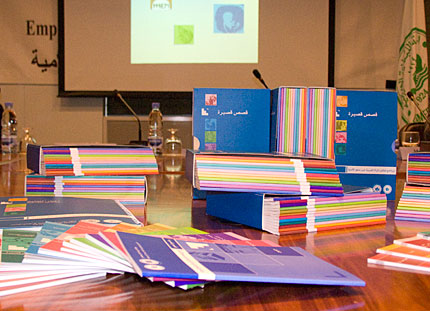Empowering women through literacy: The family/education equation
An LAU-designed literacy program for women is helping to change the shape of education and family life in Lebanon.
![[photo]](literacy-01-180.jpg)
According to LAU alumna Nimat Kanaan, former director-general of the Ministry of Social Affairs, illiteracy is on the wane in Lebanon.
![[photo]](literacy-02-180.jpg)
Trainees at work with Anita Nassar (middle), assistant director of LAU's Institute for Women's Studies in the Arab World and coordinator of the Empowering Arab Women Through Literacy program.
In fact the program has been so successful that it will soon be starting in Jordan, which has already requested program kits and training assistance.
Anita Nassar, IWSAW’s assistant director and program coordinator, says “the word ‘literacy’ has come to embrace awareness and knowledge” as part of the program.
While creating a series of 12 second-level books for the EAWTL program, Nassar drew on short stories — about civic education, women’s empowerment, health, etc. — that would arise during level-one literacy sessions for illiterate adults organized by the Ministry of Social Affairs, for which she trained the trainers.
The books were completed with the help of funding by the U.S. government’s Middle East Partnership Initiative, to enable women to develop their reading skills above the basic level. The educational kit was adopted by the Ministry of Social Affairs, and Nassar trains local women to teach the materials at the ministry’s social development centers across Lebanon.
“I tell the trainers change takes time,” Nassar says. “We go back and visit the women after a year to see if there’s a change in the home, whether the children are at school, getting their vaccines. Sometimes they have started small businesses.”
Business skills are also taught as part of the wider literacy initiative. “We teach [women] how to prepare a real budget, put money aside, work out priorities, and budget time as well as money,” Nassar says.
Another LAU literacy expert, Dr. Rima Bahous, an LAU faculty member in the Education Department, acknowledges that literacy is as much about knowledge as reading and writing. When the parents of underprivileged children are educated or are undergoing education, their children are more likely to go to school as well, Bahous says.
Women who have completed the EAWTL program have subsequently appealed to the social affairs ministry for help in getting their children to school — often a challenge for less well-off families in remote areas.
“The women come to understand the importance of education in terms of quality of life and opportunities, and will insist on their children staying in education until they get a degree,” Nassar says. “It’s the best way to break the chain of poverty.”
Dr. Raed Mohsen, chair of the LAU Arts and Communication Department and a prominent family therapist, agrees that the education levels of parents usually have a positive effect on the children. “In families where the parents are not academic achievers or tend not to be motivated, the children also will not be motivated,” he says.
The EAWTL program has reached family members directly and indirectly, Nassar says. “We’re often doing a double job, because the husbands don’t know about these issues either.” Additionally, women may often be reluctant to engage their husbands in domestic chores due to how such things might be perceived socially and culturally.
In one story on women’s rights that is part of the course, a husband helps with all the chores, which is something that remains uncommon in Eastern societies. He washes, dusts and cooks, but when his wife catches him putting out the laundry to dry, she scolds him because the neighbors might see.
“Sometimes it’s the woman who holds back because she’s afraid of what the neighbors, her mom or her mother-in-law might say,” Nassar explains. “But we put the message across subtly. We don’t want to empower women over their husbands — it’s about partnership.”
The good news is that illiteracy is on the wane in Lebanon, says LAU alumna Nimat Kanaan, former director-general of the Ministry of Social Affairs.
“Before the war we reached the point where we thought illiteracy was nearly eradicated in Lebanon,” the LAU alumna says. But with the war’s widespread displacement, loss and educational disruption, the phenomenon rose again.
After the war, the ministry established a committee to eradicate illiteracy, and several NGOs took up the task too, addressing the problem among adults and children.
One such NGO, Teach For Lebanon, aims to reduce education inequalities among children in well-off and poor areas of Lebanon.
In the past six weeks, TFL and LAU’s Teacher Training Institute held a seminar to train Lebanese university graduates to teach in schools located in Lebanon’s poverty-stricken villages throughout the country’s northern, southern and Bekaa regions.
The efforts undertaken by different parties to fight illiteracy give hope that the future might be brighter. “I think in 10 years at the most, we will no longer have illiterate people in Lebanon,” Kanaan says.
 The kit with a series of 12 second-level literacy books published for the EAWTL program by LAU’s IWSAW.
The kit with a series of 12 second-level literacy books published for the EAWTL program by LAU’s IWSAW.More
Latest Stories
- LAU Simulation Models Celebrate 20 Years of Learning, Leadership and Service
- LAU Stands Out on the Sustainability Scores
- Michael Haddad Walks Again for Climate Change and Food Security
- AI in Clinical Practice: Tools, Ethics, and the Human Touch
- Interior Design Students Honor the Past by Designing the Future
- LAU’s 100th Commencement Continues With Beirut Class of 2025
- Wadad Halwani: Mourning, Memory and Movement
- LAU’s 100th Commencement Begins With Byblos Class of 2025

